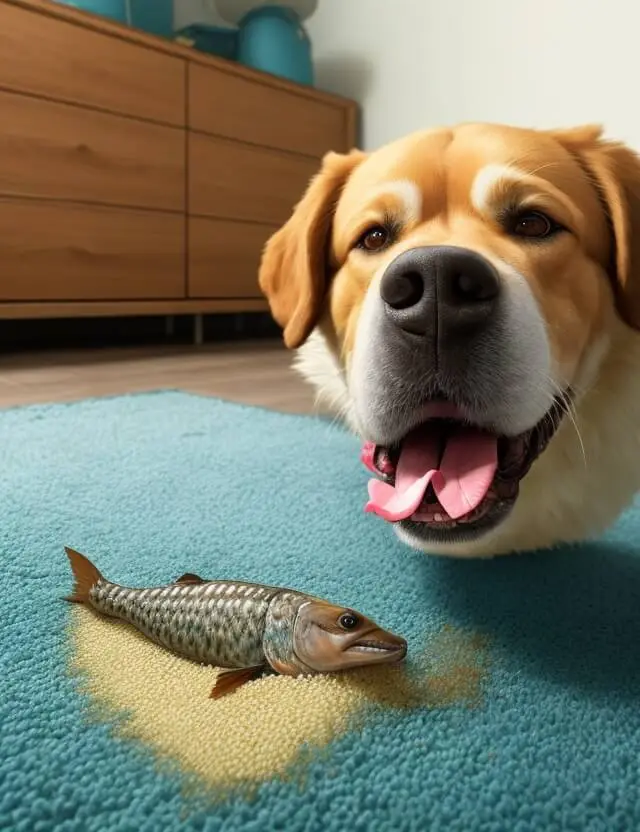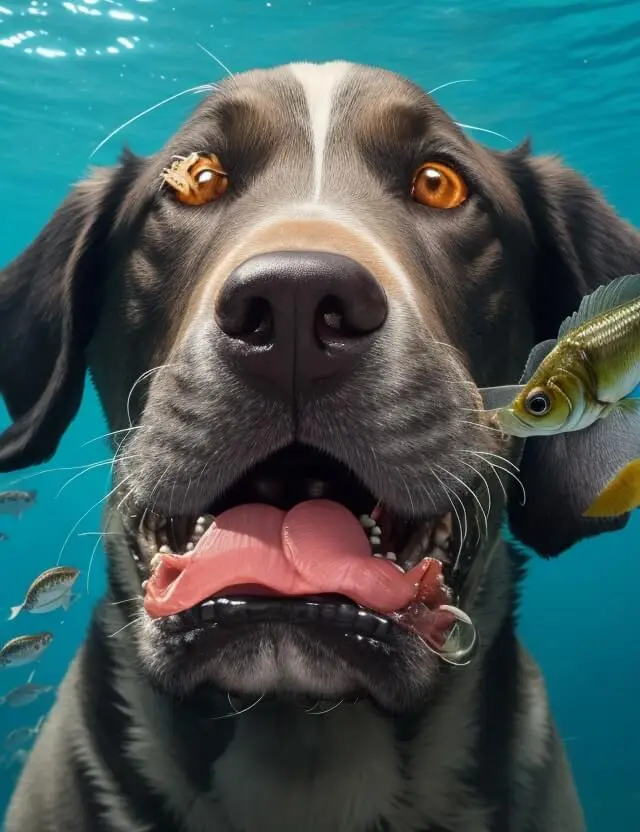Introduction-Why Does Your Dog’s Breath Smell Like Fish?
Ever wondered, “why does dogs breath smell like fish?” You’re not alone. This peculiar olfactory experience has puzzled many a dog owner. Understanding the reasons behind your furry friend’s fishy breath isn’t just a matter of satisfying curiosity.
It’s crucial for their well-being and yours. In this article, I’ll unravel the mysteries behind this phenomenon, from dietary quirks to medical concerns, and even delve into gender-specific factors. So, let’s embark on this aromatic journey together!

Stay tuned as we explore the nitty-gritty of your dog’s fishy breath. We’ll cover common causes, delve into the role of diet, and even discuss when it’s time to consult a vet. By the end, you’ll be armed with the knowledge you need to tackle this smelly situation head-on.
Key Takeaways
- Diet and Dental Health: Often the most common culprits, but easily manageable.
- Medical Concerns: Sometimes the issue is more serious and requires immediate attention.
- Gender and Age Factors: Female dogs and puppies might have specific reasons for fishy breath.
In the end, understanding the cause is the first step in finding a solution. Whether it’s changing their diet, improving their dental hygiene, or consulting a vet, there are multiple paths you can take to improve your dog’s oral health. And remember, when in doubt, it’s always best to consult a vet for a thorough diagnosis and tailored treatment plan.
Common Causes of Fishy Breath in Dogs
So, you’ve sniffed out the issue and are asking, “why does dogs breath smell like fish?” Well, you’re in the right place to dig up some answers. There are a variety of factors that can contribute to your dog’s fishy breath, and it’s not always as straightforward as you might think.

Diet: The Culinary Culprit
First on our list? Diet. If your dog loves to munch on fish-based kibble or treats, it’s no big mystery why their breath smells like the ocean. But sometimes, even non-fishy foods can cause that distinct aroma. Certain proteins break down in a way that produces fishy-smelling compounds.
Dental Drama: Beyond the Bite

Next, let’s talk dental health. Plaque and tartar aren’t just unsightly; they can also be stinky. When bacteria accumulate in your dog’s mouth, they can produce foul-smelling substances, including the fishy scent you’re detecting.
Table: Common Culprits Behind Fishy Dog Breath
| Factor | Description | Solution |
|---|---|---|
| Diet | Fish-based foods or certain proteins can cause fishy breath. | Switch to a different protein source. |
| Dental Health | Plaque and tartar build-up leads to bacterial growth. | Regular dental cleanings and chew toys. |
Other Sneaky Factors
Lastly, don’t rule out other less obvious factors. Sometimes, dogs get into things they shouldn’t, like the garbage or even the cat’s litter box. Both can result in a fishy aftermath.
So, there you have it—a quick rundown of the usual suspects behind your dog’s fishy breath. Whether it’s their chow or their chompers, you’re now one step closer to solving this smelly mystery.
Dietary Factors
So you’ve been pondering, “why does dogs breath smell like fish?” and you’re hungry for answers. Well, let’s chew on this: diet plays a massive role in how your dog’s breath smells. It’s not just what they eat, but also how those foods break down in their system.
Fish-Based Foods: A Direct Link

Firstly, let’s state the obvious. If your dog’s diet is rich in fish-based foods, then it’s no wonder their breath smells like a fish market. Omega-3 fatty acids, commonly found in fish, are excellent for your dog’s coat but might leave their breath smelling, well, fishy.
Protein Breakdown: The Sneaky Offender
But what if your dog isn’t feasting on fish? Certain proteins can break down into amino acids that have a fishy scent. So, even if you’re feeding your dog chicken or beef, you might still encounter that maritime aroma.
Table: Types of Food and Their Fishy Impact
| Food Type | Fishy Smell Potential | Alternative Choices |
|---|---|---|
| Fish-Based | High | Chicken or Beef |
| High-Protein | Medium | Plant-Based Proteins |
| Processed Treats | Low-Medium | Homemade Treats |
Treats and Snacks: Don’t Forget the Extras
Treats and snacks can also be culprits. Many commercial dog treats contain fish oil for added health benefits, which could contribute to the fishy smell. Always check the ingredients!
Hydration: The Unsung Hero
Lastly, hydration can affect how your dog’s breath smells. A well-hydrated dog is less likely to have concentrated, smelly breath. So keep that water bowl filled!

In summary, your dog’s diet is a key player in the fishy breath saga. Whether it’s the main course or the occasional treat, what goes into your dog’s mouth has a direct impact on what comes out of it. Armed with this info, you’re well on your way to solving the fishy mystery.
Dental Health and Oral Hygiene
If you’ve ever wondered, “why does dogs breath smell like fish?” you might be surprised to learn that the answer could be lurking in your dog’s mouth—specifically, their dental health. Yes, those pearly whites (or not-so-pearly) can be a breeding ground for fishy smells. Let’s delve into the dental details.
Plaque and Tartar: The Sticky Situation
First up, plaque and tartar. These dental dilemmas aren’t just for humans; dogs get them too. When plaque hardens into tartar, it becomes a haven for bacteria. These bacteria can produce some rather fishy-smelling compounds.
Gum Disease: More Than Just a Sore Spot
Gum disease is another dental health issue that can contribute to fishy breath. Inflamed gums can harbor bacteria, leading to bad breath and, yes, that fishy smell you’ve been noticing.
Table: Dental Issues and Their Fishy Consequences
| Dental Issue | Fishy Smell Cause | Preventative Measures |
|---|---|---|
| Plaque and Tartar | Bacterial growth | Regular brushing and dental chews |
| Gum Disease | Inflamed gums harboring bacteria | Dental check-ups and antiseptic rinses |
The Importance of Regular Dental Care
So, how can you combat these dental demons? Regular dental care is key. Brushing your dog’s teeth, using dental chews, and even opting for dental-specific dog foods can make a world of difference.
The DIY Route: Home Remedies
If you’re a fan of home remedies, consider using coconut oil as a natural toothpaste or adding a splash of apple cider vinegar to your dog’s water. Both have antibacterial properties and can help keep that fishy smell at bay.
In a nutshell, your dog’s dental health is a major player in the fishy breath game. From plaque to gum disease, several dental issues could be the culprits. But fear not! With proper oral care, you can turn the tide and make that fishy smell swim away.
Medical Concerns
If you’ve been scratching your head, pondering “why does dogs breath smell like fish?” you might need to look beyond diet and dental health. Sometimes, the root cause is medical. Let’s delve into some health-related reasons that could be behind that fishy aroma wafting from your dog’s mouth.
Gastrointestinal Issues: More Than Just a Tummy Ache
First on the medical list? Gastrointestinal issues. Problems in the digestive tract can manifest in various ways, including fishy breath. If your dog’s gut isn’t processing food properly, it could lead to smelly consequences.
Kidney Problems: A Serious Concern
Next, we have kidney problems. If your dog’s kidneys aren’t functioning optimally, toxins can build up in the body, leading to bad breath that might smell fishy. This is a serious issue that requires immediate veterinary attention.
Table: Medical Issues and Their Fishy Implications
| Medical Issue | Fishy Smell Cause | Recommended Action |
|---|---|---|
| Gastrointestinal Issues | Poor digestion | Consult a vet for diagnosis and treatment |
| Kidney Problems | Toxin build-up | Immediate veterinary attention |
Other Health Concerns: Don’t Rule Them Out
Other health issues like diabetes and liver disease can also affect your dog’s breath, although they’re less likely to cause a fishy smell. However, any change in your dog’s breath should prompt a vet visit.
The Importance of Regular Check-Ups
Regular vet check-ups are crucial for catching these issues early. If you notice a persistent fishy smell, it’s time to consult your vet. Early diagnosis can make all the difference.
In summary, while diet and dental health are common culprits behind fishy dog breath, medical issues can also be at play. From gastrointestinal woes to kidney concerns, it’s essential to consider these serious factors. A vet consultation is the best course of action for any persistent fishy breath.
Medical Concerns
So you’ve been sniffing around, asking, “why does dogs breath smell like fish?” and you’re still not satisfied with the answers. Well, it’s time to consider some medical concerns that could be the culprits. Sometimes, the issue isn’t just what your dog eats or how often they get their teeth brushed; it could be something more serious.
Gastrointestinal Woes: Beyond Belly Rubs
First on the medical agenda? Gastrointestinal issues. If your dog’s digestive system is out of whack, it can lead to some pretty fishy breath. Whether it’s indigestion, food intolerances, or more severe conditions like pancreatitis, gastrointestinal problems can manifest in your dog’s breath.
Kidney Troubles: A Scent of Seriousness
Next up, kidney problems. If your dog’s kidneys aren’t filtering toxins properly, it can result in a buildup of waste products. And yes, this can make their breath smell fishy. This is a serious concern that requires immediate veterinary attention.
Table: Medical Factors and Fishy Breath
| Medical Issue | Cause of Fishy Smell | Next Steps |
|---|---|---|
| Gastrointestinal Issues | Digestive problems | Consult a vet |
| Kidney Problems | Toxin buildup | Immediate vet visit |
Other Health Issues: Don’t Overlook Them
While gastrointestinal and kidney issues are the most common medical reasons for fishy breath, other health concerns like liver disease or even diabetes could also be factors. Any persistent change in your dog’s breath warrants a vet visit.
Regular Vet Visits: A Must-Do
Don’t underestimate the power of regular vet check-ups. Early diagnosis can be a lifesaver, literally. If you’ve noticed a persistent fishy smell, it’s time to consult your vet.
In a nutshell, if you’re still wondering why your dog’s breath smells like fish, it might be time to look at some medical concerns. From digestive issues to kidney problems, these are serious matters that require professional attention. So, if that fishy smell persists, make a vet appointment, pronto.
Gender-Specific Factors
If you’ve been on a quest to find out “why does dogs breath smell like fish?” you might be intrigued to learn that gender can play a role. Yep, whether your dog is a he or a she could have an impact on that fishy aroma. Let’s dig into this gender-specific angle.
Female Dogs: Hormonal Havoc
First up, female dogs. Hormonal changes, especially during heat cycles, can affect a dog’s breath. While it’s not always fishy, some owners have reported a change in the smell of their female dog’s breath during these times.
Male Dogs: Less Likely but Not Off the Hook
As for male dogs, they’re generally less prone to fishy breath related to hormonal changes. However, that doesn’t mean they’re entirely off the hook. Other factors like diet and dental health can still make a male dog’s breath smell fishy.
Table: Gender and Fishy Breath
| Gender | Likelihood of Fishy Breath | Common Reasons |
|---|---|---|
| Female | Higher during heat cycles | Hormonal changes |
| Male | Generally lower | Diet and dental health |
Spaying and Neutering: A Potential Solution
One way to potentially reduce fishy breath, especially in female dogs, is through spaying. Spaying eliminates the heat cycles, which in turn could reduce the chances of fishy breath related to hormonal changes.
The Bottom Line: Gender Matters, but It’s Not Everything
So, while gender can play a role in your dog’s fishy breath, it’s not the be-all and end-all. Other factors like diet, dental health, and medical issues can still be major players, regardless of whether your dog is male or female.
In summary, if you’ve been scratching your head over the fishy smell coming from your dog’s mouth, consider their gender as a potential factor. But remember, it’s just one piece of the puzzle. For a comprehensive understanding, you’ll need to look at the whole picture.
Puppy Concerns
If you’re a new puppy parent and you’ve caught yourself wondering, “why does dogs breath smell like fish?” you’re not alone. Puppies, with their boundless energy and adorable antics, can also bring along some fishy breath. Let’s explore why this happens and whether you should be concerned.
Teething Troubles: A Rite of Passage
Firstly, teething. Puppies go through a teething phase, and during this time, their breath can smell a bit off. While it’s not always fishy, the smell can vary depending on what they’ve been chewing on.
Puppy Diet: A Learning Curve
Next, let’s talk about puppy diet. Puppies are often on specialized diets that are rich in nutrients they need for growth. Sometimes, these diets can contribute to fishy breath, especially if they contain fish-based ingredients.
Table: Puppy-Specific Factors and Fishy Breath
| Puppy Factor | Fishy Smell Cause | What to Do |
|---|---|---|
| Teething | Chewing on various items | Offer teething toys |
| Puppy Diet | Fish-based ingredients | Consider diet change |
Exploratory Behavior: The World in Their Mouth
Puppies are curious creatures. They explore the world by putting just about everything in their mouths, from sticks and leaves to, unfortunately, less pleasant things. This exploratory behavior can also lead to fishy breath.
When to Worry: Red Flags
While fishy breath in puppies is often not a cause for concern, persistent bad breath could indicate underlying issues like gastrointestinal problems. If the fishy smell persists, a vet visit is in order.
In a nutshell, if you’ve been puzzled by your puppy’s fishy breath, there are several factors to consider. From teething to diet and even their natural curiosity, many elements can contribute to the smell. However, if the issue persists, it’s always best to consult a vet for a thorough check-up.
Treatment and Prevention
So you’ve been on this olfactory journey, asking “why does dogs breath smell like fish?” and now you’re ready for some solutions. Let’s dive into the various ways you can treat and prevent fishy breath in your canine companion.
Dental Care Products: A Fresh Start
First up, dental care products. From toothbrushes designed for dogs to dental chews that help scrape off plaque, there’s a plethora of products aimed at improving your dog’s oral health. These can be a great first step in tackling that fishy smell.
Diet Changes: A Flavorful Fix
Next, consider diet changes. If your dog’s food is the culprit, switching to a different protein source or a specialized dental care formula can make a significant difference.
Table: Treatment and Prevention Options
| Method | Effectiveness | Examples |
|---|---|---|
| Dental Care Products | High | Dog toothbrushes, dental chews |
| Diet Changes | Medium-High | Non-fish-based kibble, dental formulas |
Home Remedies: Nature’s Solutions
If you’re into home remedies, there are several natural options to explore. Coconut oil can act as a natural toothpaste, while parsley can be a natural breath freshener. Some people even add a splash of apple cider vinegar to their dog’s water for its antibacterial properties.
Regular Vet Visits: The Best Prevention
The best prevention, of course, is regular vet visits. A thorough dental check-up can catch issues before they become bigger problems, and your vet can recommend specific treatments tailored to your dog’s needs.
In summary, treating and preventing fishy breath in your dog is entirely doable. From specialized products to simple home remedies, there are plenty of ways to tackle the issue. And remember, regular vet visits are your best bet for keeping that fishy smell at bay.
When to Consult a Vet
If you’ve been on this aromatic adventure, asking “why does dogs breath smell like fish?” you might be wondering when it’s time to bring in the professionals. Let’s discuss the signs that indicate it’s time to consult a vet.
Persistent Fishy Smell: A Red Flag
Firstly, if the fishy smell is persistent and doesn’t go away with home remedies or dental care products, it’s time to consult a vet. This could be a sign of underlying health issues.
Other Symptoms: Beyond Bad Breath
Next, if your dog shows other symptoms like lethargy, loss of appetite, or changes in urination, these could be indicators of a more serious issue that requires immediate attention.
Table: Signs It’s Time to Consult a Vet
| Sign | Level of Concern | Recommended Action |
|---|---|---|
| Persistent Fishy Smell | High | Immediate vet consultation |
| Other Symptoms | Very High | Immediate vet consultation |
Conclusion
So, we’ve journeyed through the various factors that can answer the question, “why does dogs breath smell like fish?” From diet and dental health to medical concerns and even gender-specific factors, there are numerous reasons why your dog’s breath might smell fishy.
FAQ: All You Need to Know About Fishy Dog Breath
What causes a dog’s breath to emit a fishy aroma?
Fishy breath in dogs can be due to various factors, including diet, dental health, and even medical issues like gastrointestinal problems or kidney disease.
Is fishy breath in dogs a sign of underlying health issues?
It can be. Persistent fishy breath could indicate medical concerns like kidney problems or gastrointestinal issues.
How can I determine if my dog’s fishy breath warrants a vet visit?
If the fishy smell persists despite trying home remedies or dental care products, or if your dog shows other symptoms like lethargy or loss of appetite, it’s time to consult a vet.
Are certain dog breeds more prone to having fish-scented breath?
There’s no conclusive evidence to suggest that specific breeds are more prone to fishy breath. However, breeds with dental issues may be more susceptible.
Could a dog’s diet be the culprit behind its fishy breath?
Absolutely. Diets rich in fish-based ingredients can contribute to fishy breath.
Do dental issues contribute to a dog’s fishy breath?
Yes, dental issues like plaque, tartar, and gum disease can lead to fishy breath.
What home remedies exist for treating a dog’s fishy breath?
Coconut oil and parsley are popular home remedies. Some people also add a splash of apple cider vinegar to their dog’s water.
How often should I be concerned about my dog’s fishy breath?
If the fishy smell is persistent and accompanied by other symptoms, it’s a cause for concern and warrants a vet visit.
Can fishy breath in dogs be a temporary condition?
Yes, it can be temporary, especially if related to something the dog ate or because they are teething.
What types of dog food can help alleviate fishy breath?
Dog foods that are not fish-based and those formulated for dental health can help.
Is it normal for puppies to have fishy breath?
It can be, especially during teething or if they are exploring and chewing on various things.
Can fishy breath in dogs indicate gastrointestinal problems?
Yes, gastrointestinal issues can manifest as fishy breath in dogs.
How do vets diagnose the cause of a dog’s fishy breath?
Vets may perform dental exams, blood tests, and other diagnostic tests to determine the cause.
Are there any over-the-counter products that can help with a dog’s fishy breath?
Yes, dental chews, dog toothbrushes, and specialized dog toothpaste can help.
Can fishy breath in dogs be linked to kidney or liver issues?
Yes, especially if the fishy breath is persistent and accompanied by other symptoms.
How do oral hygiene products for dogs combat fishy breath?
They help remove plaque and tartar, which can harbor bacteria that cause fishy breath.
What role do dog treats play in causing or preventing fishy breath?
Some dog treats are formulated to improve dental health and can help prevent fishy breath, while others might contribute to the problem.
Can natural supplements help in eliminating a dog’s fishy breath?
Some natural supplements like probiotics can help improve gut health, which in turn can alleviate fishy breath.
Is fishy breath in dogs more common in older or younger dogs?
It can occur at any age but is often more common in older dogs due to a higher likelihood of dental issues.
How can I prevent my dog from developing fishy breath in the future?
Regular dental care, a balanced diet, and routine vet check-ups are the best preventive measures.
Feel free to consult this FAQ whenever you’re puzzled by your dog’s fishy breath. It covers a wide range of concerns and offers practical solutions.
Hi, I’m John and I love dogs. Ever since I was a kid, I always wanted to have a furry friend by my side. I grew up with a golden retriever named Max, who taught me a lot about loyalty, friendship, and fun. He was my best buddy for 12 years, and I miss him every day.
